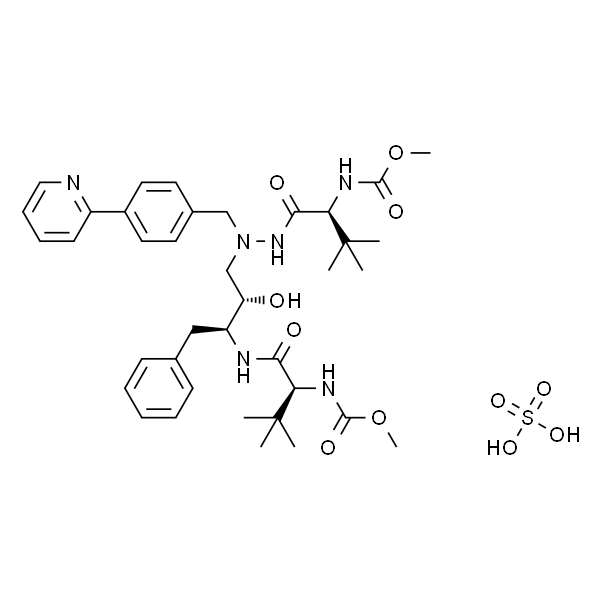Chemical Properties:
Package: Bottle, Aluminium foil bag, Cardboard Drum, 25kg/Drum, or according to customer's requirement. Storage Condition: Store in sealed containers at cool and dry place; Protect from light, moisture and pest infestation.Supply with High Purity and Stable Quality Chemical Name: Atazanavir Sulfate CAS: 229975-97-7 HIV-1 Protease Inhibitor API High Quality, Commercial Production| Item | Specifications |
| Appearance | White or Off-White Powder |
| Sulfate | 12.0~12.5% |
| Loss on Drying | ≤0.50% |
| Residue on Ignition | ≤0.10% |
| Heavy Metals | ≤20ppm |
| Single Impurity | ≤0.30% |
| Total Impurities | ≤1.0% |
| Purity/Analysis Method | ≥99.0% (HPLC) |
| pH | 5.0~8.0 |
| Test Standard | Enterprise Standard |
| Usage | HIV-1 Protease Inhibitor Anti-HIV |
Description:
Specifications:
Package & Storage:
| Chemical Name | Atazanavir Sulfate |
| Synonyms | BMS-232632 Sulfate |
| CAS Number | 229975-97-7 |
| CAT Number | RF-API71 |
| Stock Status | In Stock, Production Scale Up to Hundreds of Kilograms |
| Molecular Formula | C38H52N6O7.H2SO4 |
| Molecular Weight | 802.93 |
| Melting Point | 195.0~198.0℃ |
| Solubility | Insoluble in Water, Soluble in DMSO |
| Long-Term Storage | Store Long-term at -20℃ |
| Brand | Ruifu Chemical |
Advantages:
FAQ:
Application:
Atazanavir Sulfate (BMS-232632 Sulfate) (CAS: 229975-97-7) is a sulfate salt form of atazanavir that is a highly selective HIV-1 protease inhibitor, is the first protease inhibitor approved for once-daily administration. Atazanavir Sulfate is a substrate and inhibitor of CYP3A4, and an inhibitor and inducer of P-glycoprotein (P-gp). Atazanavir Sulfate is also a SARS-CoV 3CLpro inhibitor with an IC50 of 3.49 μM. Atazanavir Sulfate is an azapeptide and HIV-protease inhibitor that is used in the treatment of HIV infections and AIDS in combination with other Anti-HIV Agents, has been developed and launched by Bristol-Myers Squibb (BMS), under worldwide license from Novartis, for the treatment of HIV infection. Atazanavir was launched in the US as Reyataz™ in July 2003. Antiviral. Atazanavir has shown to be generally more potent than the five currently approved HIV-1 protease inhibitors. Atazanavir selectively inhibits the virus-specific processing of viral Gag and Gag-Pol polyproteins in HIV-1 infected cells by binding to the active site of HIV-1 protease, thus preventing the formation of mature virions. Atazanavir is not active against HIV-2.


